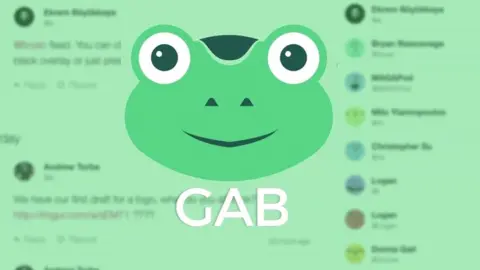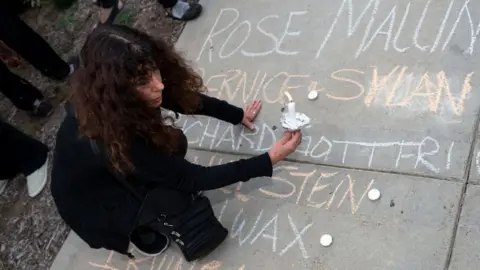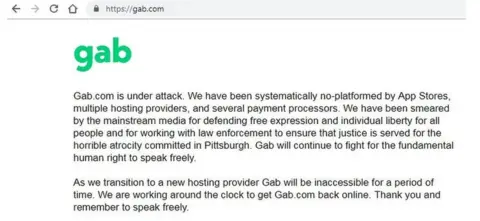Pittsburgh shooting: Gab drops offline after attack
 Gab
GabA Twitter-rival used by the man accused of a gun attack on a US synagogue has gone offline after several technology services withdrew support from it.
Gab describes itself as a defender of "free speech and expression" with nearly 800,000 users.
It has faced criticism in the past for providing an outlet for far-right figureheads and conspiracy theorists banned from other social networks.
The service has said it has "zero tolerance" for terrorism and violence.
It has, however, acknowledged that a verified account whose details matched those of the alleged Tree of Life Synagogue shooter had been active on its service.
The account, registered to Robert Bowers, had posted several anti-Semitic messages on the platform. And in a final update had written: "Screw your optics, I'm going in," shortly before the Pittsburgh attack.
Gab said it was "ready and willing to work with law enforcement" and noted that the suspect "also had accounts on other social networks".
It said "high volumes" of criminal activity were present on other social media platforms.
And it specifically criticised Twitter for having hosted posts from anti-Semites and "Isis cells", adding no-one was calling for its competitor's closure.
Even so, some of the technology companies who have severed their relationship with Gab said they were uncomfortable with its behaviour .
Among them is PayPal, which banned the company from using its money-transfer service on Saturday.
 Getty Images
Getty Images"When a site is explicitly allowing the perpetuation of hate, violence or discriminatory intolerance, we take immediate and decisive action," PayPal said in a statement.
Internet domain registrar GoDaddy also explained why it had given Gab just 24 hours to find another provider.
"In response to complaints received over the weekend, GoDaddy investigated and discovered numerous instances of content on the site that both promotes and encourages violence against people," a spokesman told BBC News.
Gab has reported that a further three technology companies, which have not publicly commented, had also banned or suspended it:
- Samsung-owned Joyent, which provides web-hosting services
- Stripe, an online payments processor
- Medium, the blogging platform, which Gab had used to publish a statement about the synagogue attack
In addition, Gab has suggested that Twitter might soon block it.
 Gab
Gab"Show the world that your TOS [terms of service] means nothing and your rules are enforced subjectively at will," it posted.
This is not the first time Gab has clashed with others.
Apple and Google have both banned its app from their stores and Microsoft stopped hosting the platform on its Azure cloud computing platform in September.
But Gab has said that it still has "plenty of options, resources and support" after the latest setback and is "working around to clock" to get back online.

Five things to know about Gab
- Critics have described the site as a "haven" for the far-right, since many controversial figures have moved there after being banned from Twitter and Facebook. Among them are conspiracy theorist Alex Jones; the founder of the neo-Nazi site the Daily Stormer, Andrew Anglin; and the anti-Islam group Britain First. Gab says it welcomes all speech and members should mute accounts they do not want to see
- Not everything is allowed on Gab. Its terms and conditions do not allow direct threats of violence. And founder Andrew Torba has previously blogged disavowing political violence. Posts that break US laws - such as copyright content and images of child abuse - are also not allowed. A small number of Gab users have complained that the platform does not allow cartoon depictions of children in sexual situations. The company has told those people to go "somewhere else"
- Gab does not carry advertising. Instead, members can pay for a Pro membership that unlocks several features, including video live-streaming
- Apple has never allowed Gab on its App Store, citing pornographic content and hate speech. Gab was available on the Google Play store until August 2017, when Google removed it citing hate speech. The company has produced versions of its app with content filters switched on by default but Apple and Google have not allowed this on their app stores. Gab has described this as Silicon Valley censorship
- Gab has faced censorship accusations of its own. In 2017, its web domain registrar ordered it to delete a post mocking Heather Heyer, a woman killed in protest-related violence in Charlottesville. Faced with the threat of losing its web domain, Gab deleted the post and sought a new domain registrar. Its cloud service provider, Microsoft, also ordered it to delete two anti-Semitic posts. However, these were subsequently removed by the writer himself. Gab has said it wants to develop its own decentralised infrastructure so that it can avoid censorship
